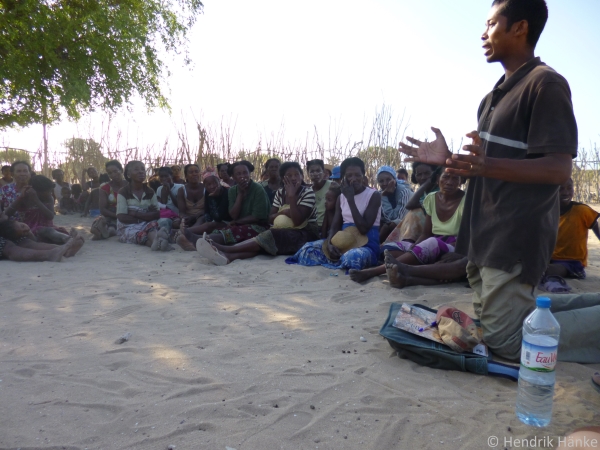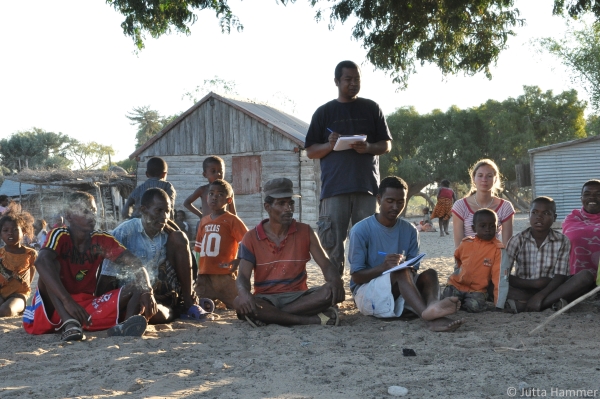
Agricultural Economics & Innovation – Work Package 7

The design and modelling of sustainable land use options requires, inter alia, an understanding of the agronomic realities that the population of the project area faces. Also, design and modelling of sustainable land use options requires an understanding of the socio-economic, cultural and ecological constraints and/or incentive structures that either retard or foster the adoption of agronomic or institutional innovations. Complementing the research of WP 2 to WP 6, WP 7 performs several in-depth studies on regular as well as innovative land use options.
One focus of WP 7 is a comprehensive, detailed one-year survey of current land use options. Complementing the broad cross-sectional 'Baseline Survey II', WP 7 aims at the qualitative (“thick”) description of current land use options as well as at their detailed quantification in terms of in- and outputs. With these data, we will parameterise realistic household production functions that facilitate a dynamic modelling of agronomic household decision-making. We call this the 'longitudinal farming study'.
Specific proposals for (more) sustainable land use ‘action strategies’ are for example:
- The fertilisation of maize and cassava fields with zebu manure
- The use of faster growing and drought-avoiding maize varieties
- The introduction of irrigated vegetable gardening

Here we focus on the practicability of the approaches and on the benefits for the local population.
The adoption of such proposals constitutes an 'innovation' for those households that did no implement these land use options before. In order to evaluate the local applicability as well as the economic potential of the action strategies, WP 7 conducts an 'innovation study' that is devided into two parts:
In the first part, we conduct qualitative interviews with households on their experiences with past and ongoing innovations. Which innovations have worked? Which have failed? Based on the 'innovation theory' (Rogers 2003), we will identify factors that either constrain or facilitate the long-term adoption of innovations. We will use this knowledge to judge and/or improve the potentials of the action strategies proposed in the SuLaMa application as well as of potential innovations identified during the course of the SuLaMa studies.
The second part of the innovation study is conducted in intensive collaboration with WP 2. In the Littoral, we jointly set up and analyse a study on the adoption of irrigated vegetable gardening. This study follows a 'market for the poor' approach. In the Mahafaly Plateau, we jointly set up and analyse a demonstration trial on manure application and drought-avoiding crops/crop varieties. The study in the Mahafaly Plateau has natural science controls (manure application, drought-avoiding crops/crop varieties), and both studies have social science controls that test for changes in attitudes towards the innovations.
Rogers, E. M., 2003. Diffusion of innovations. 5th edition. Free Press, New York.
Current thesis:
- Markets for the poor: Diffusion of innovation in rural Madagascar, Doktorarbeit: Hendrik Hänke (Universität Göttingen)
Completed thesis:
- Cassava stock management by smallholder farming households in South-Western Madagascar- Agriculture, subsistence, market and cultural influence, M.Sc. thesis: Lucile Manon (University of Lyon)
- Integration of smallholder farmers into agribusiness value chains under restrictive markets: the case of the Mahafaly Plateau in SW Madagascar, M.Sc. thesis: Claudia S. Coral-Guerra (Humboldt University of Berlin)
 For further information on this project and all current projects click here: Project List
For further information on this project and all current projects click here: Project List
|
Contact
Dr. Jan Barkmann
University of Goettingen Phone +49 551 - 3914492 This email address is being protected from spambots. You need JavaScript enabled to view it.
Hendrik Hänke
University of Goettingen This email address is being protected from spambots. You need JavaScript enabled to view it. |



.jpg)
.jpg)

